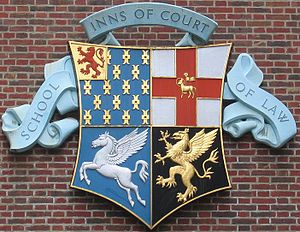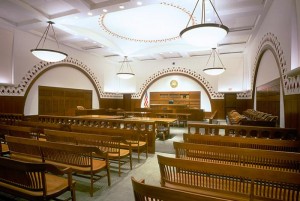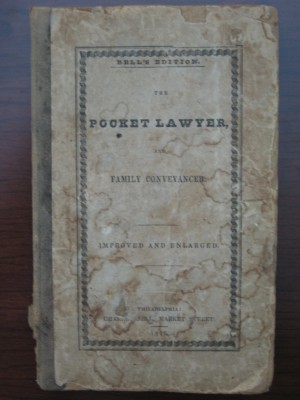James Madison introduced 39 proposed amendments to the Constitution before the House of Representatives in 1789; the House approved 17 of these, 12 of which were ultimately approved by Congress. Ten amendments, now known as the Bill of Rights, went on be ratified by the states. One of the proposed amendment, havng to do with Congressional salaries, was ratified in 1992 and is now the 27th Amendment. The twelfth proposed amendment, concerning Congressional apportionment, was ratified by 11 states as of 1792 and is considered still pending—it would now require ratification by 27 more states.
One question that I am asked from time to time has to do with the origins of the expression “passing the bar”. A common assumption is that there is some connection with admission to the legal profession and the ancient relationship between lawyers and taverns. This has some plausibility as courts in the medieval and Elizabethean eras were not infrequently held in public places, including taverns (but also including churches, town and meeting halls, and the like). However much the public may enjoy the putative connection between the legal profession and alcoholic libations, however, this is not the true origin of the term.
The word “barrister” shows us much more clearly the etymology of this phrase, as barrister (the lawyer who argues cases in court) is derived from the old French barre or Latin barra, meaning “bar”. The bar in question here was not a place that served alcohol, but rather is a reference to the wooden bar or barrier that commonly stood near the front of the courtroom at the ancient Inns of Court in London, used by the English and Welsh legal profession to admit newcomers into their ranks. A barrier, or bar, separated “benchers” from the main hall; students who had attained a certain level of expertise and standing were then “called to the bar” to participate in the Inn’s moot court exercises.
By the early 1600s, however, “bar” referred mainly to the bar in courthouses that separated the officers of the law (judges, counsel, bailiffs, etc.) from those not admitted into the legal profession or otherwise a party. Besides having a symbolic function, this might also have had a practical benefit as it separated the (sometimes racuous) spectators from those conducting and participating in the business of the court. To disbar, then, was to remove someone from the ability to come to the bar (or within the bar, as was the case with King’s or Queen’s Counsel, who were said to have been “called within the bar”). Bar eventually became synonomous with the place where cases were argued in court, and eventually with the court itself and those admitted to practice. Its modern meaning typically references formal admission to the profession of law, populary known as “passing” or being “admitted” to the bar. The “bar” today, as used in the United States, does not reference the physical separation in courtrooms (which typically still exists in some form) but rather is used as a collective noun to refer to all the members of the legal profession in a specific jurisdiction (e.g., “the Massachusetts bar”).
As an interesting aside, the modern and beautiful Moakley Federal courthouse in Boston has courtrooms that still have partitions between the gallery and the rest of the courtroom, but the partition has openings in it (see picture below); I am told this is to symbolize public access to justice.
As the Constitution gave power to the states to determine voting qualifications, prior to 1910 no states allowed women to vote. This changed with the passage of the Nineteenth Amendment, which prohibited United States citizens from being denied the right to vote on the basis of gender. The Amendment was originally introduced in Congress in 1878 but not formally ratified until 1920. Wisconsin was the first state to vote to ratify, in June 1919; and the Amendment became official with Tennessee’s vote in August 1920, thereby making the presidential election of November 1920 the first in which women across the country could vote. That election saw Warren G. Harding and Calvin Coolidge on the Republican ticket defeat James M. Cox and Franklin D. Roosevelt on the Democratic ticket. The 48th and final state to ratify the Nineteenth Amendment, Mississippi, did so in 1984. Alaska and Hawaii were not states at the time the Amendment was ratified and therefore cannot vote to do so.
Arizona has a law popularly referred to as the “Stupid Motorist Law“, which renders motorists liable for the cost of their rescue. A response to the flash floods common in the Southwestern U.S., the law states that should a motorist ignore barricades blocking a flooded roadway and later need to be rescued by public emergency services, those costs can be billed to the motorist. Motorists can also find themselves criminally liable under other statutory provisions for offences such as reckless driving and endangerment.
A citizen’s arrest — an arrest by a non-law enforcement officer — is statutorily provided for in 49 states (North Carolina is the exception) where a citizen observes a felony being committed, or when a citizen is asked by a law enforcement officer to help apprehend a suspect. States differ in whether a citizen’s arrest also extends to misdemeanors, crimes not witnessed by the arresting party, or to breaches of the peace.
The practice of jury nullification–where juries render a verdict in opposition to the evidence and the law–is a legacy of the common law notion of the independence of juries. Most commonly it involves juries acquitting a defendant in the face of guilt, due to their belief in the injustice of the law, or a belief that the law is being unjustly applied. In the case of Sparf v. U.S. (1895), the Supreme Court held that a trial judge has no responsibility to notifiy a jury of the right of nullification; as such, it is common practice for judges to forbid references to jury nullification. As of 2012, only one state — New Hampshire — allows defense attorneys to inform juries about this option.
The earliest recorded instance of capital punishment in the U.S. was in 1608, carried out in the Jamestown colony against a defendant for spying for the Spanish government. Three states have never implemented capital punishment during their statehood: Michigan, Alaska and Hawaii. Eighteen states and the District of Columbia have no enforceable death penalty statute, while 2 others have not administered it since 1976. Texas performs the largest number of executions, while Oregon has the highest rate per-capita.
The President is given the pardon power for federal crimes under Art. II, section 2 of the Constitution, which states that the President “shall have power to grant reprieves and pardons for offenses against the United States, except in cases of impeachment”. Pardon petitions are addressed to the President but usually referred further to the Office of the Pardon Attorney for a non-binding recommendation. A symbolic use of this power is the annual pardoning of a turkey as part of the National Thanksgiving Turkey Presentation.
Parole–the discretionary, provisional release of an inmate who agrees to abide by the terms of his or her early release–can be said to have its origins in antiquity, when soldiers defeated in battle pledged not to take up arms again in exchange for their release. Parole in the U.S. criminal justice system is a fairly recent invention, first introduced in 1876 in New York’s Elmira Reformatory.
Well, one of my 2014 resolutions is to find a better balance between writing blogs (which I’ve sorely neglected of late) and my other online and published work. As such, I’ve decided to embrace inspiration as it comes. The other day I found a charming–at least to me–book called The Pocket Lawyer and Family Conveyancer, this edition published in Philadelphia in 1845 by Charles Bell of Market Street. The author, identified only as a “gentleman of the Bar”, produced what was essentially a compendium of forms related to common legal transactions for laypeople, not unlike the ‘make your own will’ packages one can acquire today. Since my assumptions about what might be found in a book of this period differed somewhat from what was actually included, I thought it might be interesting to profile some of the content.
Most of the documents, not surprisingly, were related to financial and real property transactions that are still (in modified form) used today, such as IOUs, land deeds, and the like. Some, however, clearly reflect the nature of everyday life in the 1840s. One such document, clearly useful in a largely pre-industrial society, was an indenture of apprenticeship: ASSIGNMENT OF AN APPRENTICE. Know all Men by these Presents, That I, the within named Jacob Knox, for divers good causes and considerations, have assigned and set over, and by these presents as far as I lawfully may or can do, assign and set over the within Indenture, and the Apprentice therein named, unto Jeremiah Miller, his heirs and assigns. He and they performing all and singular the covenants therein contained on my part and behalf to be done, kept, and performed, and indemnifying me for the same. WITNESS my hand and seal, the twenty-first day of August, One thousand eight hundred and thirty-four.
Related to that, a form for assigning (transferring) an apprentice to another employer was also included. Other forms, such as mortgage documents and property leases, are mere wisps of what they would be today.
Entrepreneurs of the period might opt to open a “publick house” or the like. In order to do so, one generally had to petition the local court, and in Pennsylvania also to include a recommendation from “twelve respectable inhabitants” of one’s county. Here is one such template:
PETITION FOR LICENCE TO TAVERN-KEEPERS. To the Honourable the Judges of the Court of Common Pleas of Berks county, now composing and holding a Court of General Quarter Sessions of the Peace, in and for said county, of September Term, 1834. The petition of George Potts, of the borough of Reading, in the county of Berks, respectfully sheweth: That your petitioner is desirous of keeping a public house or tavern, in the house, [here describe the situation, &c.,] that he has provided himself with necessaries for the convenience and accommodation of travellers and strangers. He therefore prays your honours to grant him a license to keep a house of public entertainment in said house. And he will pray, &c. GEORGE POTTS. WE the subscribers, do certify that George Potts, the above applicant, is of good repute for honesty and temperance, and is well provided with house-room and conveniences for the lodging and accommodation of strangers and travellers.
But perhaps your troubles were–ahem–a little less pedestrian–such as want of a road? In that case: PETITION FOR LAYING OUT A ROAD. To the Honourable the Judges of the Court of Common Pleas of Juniata county, now composing a Court of Quarter Sessions of the Peace, in and for said county. The Petition of divers inhabitants of the township of _____ in said county, humbly sheweth: That your petitioners labour under great inconveniences for want of a road of highway to lead from _____ to _____ Your petitioners therefore humbly pray the Court to appoint proper persons to view and lay out the same, according to law. And they will pray &c.
And if the problem was not want of a road, but the opposite, then conversely one would want a PETITION FOR REVIEW OF A ROAD, in which the petitioners humbly sheweth: “That a road has been lately laid out, by order of the Court, from ….&c. which road, if confirmed by the Court, will be very injurious to your petitioners, and burthensome to the inhabitants of the township through which the same runs. Your petitioners therefore pray your honours to appoint proper persons to review the said road, and parts adjacent, and make report to the Court according to law.”
Married women’s property rights are reflected in the “release of dower” document for a widow–the sum she was accorded by law or her late husband’s will to provide for her after his death–in one such document. In exchange for a sum of money from her son she “doth fully and absolutely grant, remise, release, and for ever quit-claim…all the dower and thirds, right and title of dower and thirds, and all the other right, title, interest, claim, and demand whatsoever, in law and equity….”
Well, it’s just a small window into the type of legal transactions that were probably common to many in the middle class, but hopefully still interesting to fans of legal history!
Only one Justice of the Supreme Court has ever faced impeachment: Samuel Chase, signer of the Declaration of Independence, was appointed by President George Washington and served from 1796 – 1811. In 1805, articles of impeachment were brought against him in a campaign supported by President Thomas Jefferson, who was alarmed at the Supreme Court’s claims to exclusive judicial review. Chase was charged with improper conduct in several trials as well as with inflammatory political comments made to a grand jury. He was acquitted in a precedent that helped cement the existence of an independent judiciary in the U.S.



